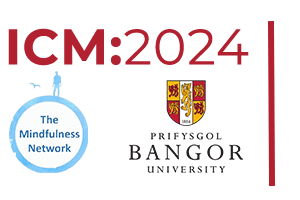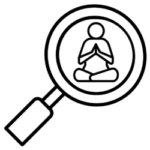Événements de connexion ICM:2024
Lorsque vous nous rejoindrez à l'Université de Bangor pour ICM:2024, vous découvrirez une multitude d'options supplémentaires pour le réseautage informel et les interactions sociales. En plus du programme principal, il y aura un dîner de conférence incontournable et une chance d'explorer les dernières présentations de posters de recherche.
Parmi les événements prévus pendant le week-end de la conférence, citons une exposition d'œuvres d'art de Stephen Batchelor et Anne Spekens, une séance de rencontre avec l'auteur, des événements gastronomiques spéciaux organisés à l'occasion de la conférence, ainsi qu'une promenade guidée de Bangor. Du 2 au 6 août, profitez du meilleur de Bangor et de tout ce que la communauté florissante de la pleine conscience a à partager.
Ces événements sont ouverts au public.
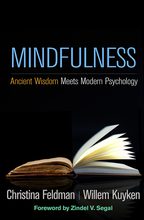 Homment la pleine conscience favorise-t-elle le bien-être psychologique ? Quels sont ses principaux mécanismes ? Quelle valeur les pratiques contemplatives ajoutent-elles aux approches déjà efficaces ? Ce livre, écrit par Christina Feldman, professeur de méditation de renom, et Willem Kuyken, éminent psychologue, offre une perspective unique et intégrative de la pleine conscience et de ses applications. Les auteurs explorent la pleine conscience depuis ses racines dans la psychologie bouddhiste jusqu'à son rôle dans la science psychologique contemporaine. Des exemples de cas approfondis illustrent comment et pourquoi l'entraînement à la pleine conscience peut aider les gens à passer de la détresse et de la souffrance à la résilience et à l'épanouissement. Les lecteurs sont amenés à considérer la pleine conscience non seulement d'un point de vue conceptuel, mais aussi d'un point de vue expérimental, à travers leur propre cheminement dans la pratique de la pleine conscience.
Homment la pleine conscience favorise-t-elle le bien-être psychologique ? Quels sont ses principaux mécanismes ? Quelle valeur les pratiques contemplatives ajoutent-elles aux approches déjà efficaces ? Ce livre, écrit par Christina Feldman, professeur de méditation de renom, et Willem Kuyken, éminent psychologue, offre une perspective unique et intégrative de la pleine conscience et de ses applications. Les auteurs explorent la pleine conscience depuis ses racines dans la psychologie bouddhiste jusqu'à son rôle dans la science psychologique contemporaine. Des exemples de cas approfondis illustrent comment et pourquoi l'entraînement à la pleine conscience peut aider les gens à passer de la détresse et de la souffrance à la résilience et à l'épanouissement. Les lecteurs sont amenés à considérer la pleine conscience non seulement d'un point de vue conceptuel, mais aussi d'un point de vue expérimental, à travers leur propre cheminement dans la pratique de la pleine conscience.
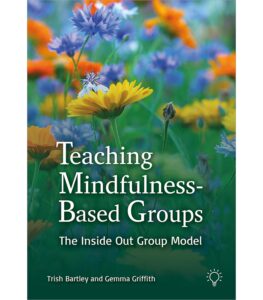 Enseigner aux groupes fondés sur la pleine conscience
Enseigner aux groupes fondés sur la pleine conscience
Les programmes basés sur la pleine conscience ont été conçus pour être enseignés en groupe, mais il existe peu ou pas d'informations sur la manière d'utiliser le potentiel d'un groupe pour améliorer l'apprentissage des participants. Basé sur un modèle théorique solide, ce livre comble cette lacune.
Thérapie cognitive basée sur la pleine conscience pour le cancer : Se tourner doucement vers
Thérapie cognitive basée sur la pleine conscience pour le cancer présente un cours de MBCT de huit semaines qui a fait ses preuves en clinique et qui s'adresse spécifiquement aux personnes atteintes d'un cancer.
- Il est de plus en plus évident que la pleine conscience est une intervention efficace et rentable pour réduire l'impact psychologique négatif du cancer et de son traitement.
- S'appuie sur l'expérience de l'auteur en matière de travail avec des personnes atteintes d'un cancer et sur sa propre expérience récente de l'utilisation de la pleine conscience dans le cadre du diagnostic et du traitement du cancer.
- Des histoires de patients atteints de cancer illustrent l'apprentissage et les thèmes clés du cours.
- Inclut de nouvelles pratiques courtes et des processus de groupe développés par l'auteur.
La pleine conscience : Une approche bienveillante de la vie avec le cancer
La pleine conscience : Une approche bienveillante de la vie avec le cancer offre aux personnes atteintes d'un cancer un moyen d'intégrer la pleine conscience et la bienveillance dans leur vie, afin de les aider à relever le défi d'une maladie potentiellement mortelle.
- Adapte la thérapie cognitive basée sur la pleine conscience (Mindfulness-Based Cognitive Therapy, MBCT), une approche fondée sur des preuves solides pour les personnes souffrant de dépression récurrente, aux besoins et aux défis des personnes atteintes d'un cancer.
- Présente le cours standard de 8 semaines de MBCT pour le cancer dans un format flexible conçu pour s'adapter au calendrier, au contexte et à la situation de chaque lecteur.
- Basé sur plus de 15 ans de développement de programmes et d'application clinique par l'auteur, ainsi que sur le travail et l'expérience d'enseignants de la pleine conscience dans d'autres centres de cancérologie à travers le monde.
- Fournit des pratiques et des approches spécifiques adaptées aux différentes phases de l'expérience du cancer - du diagnostic et du traitement à la gestion de la vie avec le cancer, en passant par l'incertitude.
- Cinq récits détaillés de personnes touchées par le cancer qui ont utilisé des pratiques basées sur la pleine conscience pour les soutenir dans leur propre expérience de la maladie, de la vie et du traitement.
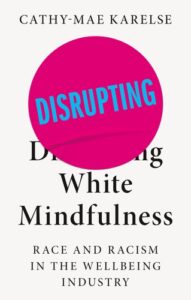 Perturber la pleine conscience des Blancs offre un commentaire opportun sur les récits dominants qui façonnent l'industrie de la pleine conscience - la blancheur, le postracialisme et le néolibéralisme. Son positionnement "apolitique" crée des institutions qui s'intègrent confortablement dans des sociétés de plus en plus divisées. Le profil racial et sexuel de ces institutions révèle un profil blanc et de classe moyenne des décideurs, des éducateurs et du personnel, qui se reflète dans le public. Les mécanismes qui recyclent la blancheur de l'industrie comprennent des pédagogies corporatistes, des édits d'autorité, un désengagement vis-à-vis de la différence et des utilisations inappropriées de la pleine conscience qui éloignent les personnes de la majorité mondiale. Un mouvement émergent en plein essor, axé sur une pleine conscience imprégnée de justice et sur un bien-être libérateur, décolonise la pleine conscience et décentre la blancheur. Son fondement sur les savoirs indigènes, du Sud et queer tire parti de la différence pour produire des solutions multiples axées sur la libération. Il y a de la place pour que la pleine conscience blanche change.
Perturber la pleine conscience des Blancs offre un commentaire opportun sur les récits dominants qui façonnent l'industrie de la pleine conscience - la blancheur, le postracialisme et le néolibéralisme. Son positionnement "apolitique" crée des institutions qui s'intègrent confortablement dans des sociétés de plus en plus divisées. Le profil racial et sexuel de ces institutions révèle un profil blanc et de classe moyenne des décideurs, des éducateurs et du personnel, qui se reflète dans le public. Les mécanismes qui recyclent la blancheur de l'industrie comprennent des pédagogies corporatistes, des édits d'autorité, un désengagement vis-à-vis de la différence et des utilisations inappropriées de la pleine conscience qui éloignent les personnes de la majorité mondiale. Un mouvement émergent en plein essor, axé sur une pleine conscience imprégnée de justice et sur un bien-être libérateur, décolonise la pleine conscience et décentre la blancheur. Son fondement sur les savoirs indigènes, du Sud et queer tire parti de la différence pour produire des solutions multiples axées sur la libération. Il y a de la place pour que la pleine conscience blanche change.
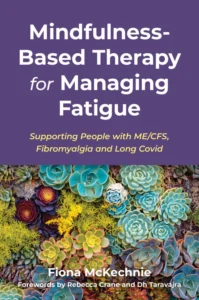 La thérapie basée sur la pleine conscience pour gérer la fatigue Ce guide est basé sur un programme de 8 semaines de thérapie cognitive basée sur la pleine conscience. Il répond au besoin croissant d'adapter la pleine conscience à la gestion de l'EM/SFC, de la fibromyalgie, du Long Covid et d'autres états de fatigue chronique.
La thérapie basée sur la pleine conscience pour gérer la fatigue Ce guide est basé sur un programme de 8 semaines de thérapie cognitive basée sur la pleine conscience. Il répond au besoin croissant d'adapter la pleine conscience à la gestion de l'EM/SFC, de la fibromyalgie, du Long Covid et d'autres états de fatigue chronique.
S'appuyant sur les connaissances actuelles et les approches théoriques de Long Covid et de l'EM/FCF, ce livre permet aux praticiens de comprendre comment ils peuvent adapter leur enseignement pour répondre aux besoins et aux défis spécifiques des patients, y compris les adaptations pour le brouillard cérébral, les approches du repos, du mouvement, de l'activité quotidienne et des pensées et émotions difficiles qui l'accompagnent. Des contributions de personnes qui gèrent l'EM, la fibromyalgie et la fatigue chronique grâce à la pleine conscience sont incluses, ainsi que des conseils pratiques et des plans détaillés de séances hebdomadaires, que ce soit en personne ou en ligne. Rempli de diagrammes et d'illustrations utiles, ce guide permet aux praticiens d'élargir considérablement le champ des personnes qu'ils peuvent atteindre et de donner aux clients vivant avec des maladies souvent isolantes les moyens d'appliquer cette approche à long terme dans leur vie de tous les jours.
Le Bouddha a enseigné la pratique de l'amour bienveillant et de la compassion,
Dans un monde qui encourage souvent l'égocentrisme et la recherche individuelle, L'art subtil de la sollicitude par Rivière Wolton offre une perspective rafraîchissante qui explore l'impact profond de la compassion dans nos vies. Ce livre, qui suscite la réflexion, emmène les lecteurs dans un voyage transformateur, les guidant pour révéler le véritable potentiel de la compassion et sa capacité à créer des liens significatifs et à favoriser l'épanouissement personnel.
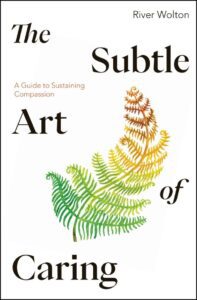 L'art subtil de la sollicitude de River Wolton est un livre novateur qui remet en question les normes sociétales et encourage les lecteurs à considérer la compassion comme une force de transformation. En mettant l'accent sur le pouvoir de la compassion et sur l'entretien de liens authentiques, Wolton offre une perspective rafraîchissante qui trouve un écho profond chez les lecteurs à la recherche d'une vie plus épanouissante et plus utile. Grâce à des stratégies pratiques et à des réflexions stimulantes, ce livre fournit les outils nécessaires pour cultiver l'empathie, à la fois pour soi-même et pour les autres. En lisant ce livre, vous vous embarquerez dans un voyage remarquable qui non seulement favorisera votre développement personnel, mais vous donnera aussi les moyens d'avoir un impact positif sur le monde qui vous entoure.
L'art subtil de la sollicitude de River Wolton est un livre novateur qui remet en question les normes sociétales et encourage les lecteurs à considérer la compassion comme une force de transformation. En mettant l'accent sur le pouvoir de la compassion et sur l'entretien de liens authentiques, Wolton offre une perspective rafraîchissante qui trouve un écho profond chez les lecteurs à la recherche d'une vie plus épanouissante et plus utile. Grâce à des stratégies pratiques et à des réflexions stimulantes, ce livre fournit les outils nécessaires pour cultiver l'empathie, à la fois pour soi-même et pour les autres. En lisant ce livre, vous vous embarquerez dans un voyage remarquable qui non seulement favorisera votre développement personnel, mais vous donnera aussi les moyens d'avoir un impact positif sur le monde qui vous entoure.
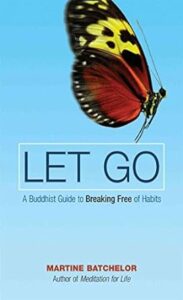 Lâcher prise : Un guide bouddhiste pour se libérer des habitudes
Lâcher prise : Un guide bouddhiste pour se libérer des habitudes
Lorsque nous nous libérons des habitudes qui nous limitent, un nouveau monde de possibilités s'ouvre à nous. En Lâcher priseMartine Batchelor montre la voie à suivre.
Les schémas mentaux négatifs peuvent se manifester par la peur, l'évitement, la dépression, la dépendance, le jugement de soi ou d'autrui, et toute une série d'autres formes physiques, mentales ou psychologiques. Lâcher prise vise à comprendre ce qui est à l'origine de ces comportements afin que nous puissions en reprendre le contrôle. Chaque chapitre se termine par un exercice ou une méditation guidée qui permet au lecteur de travailler sur les habitudes négatives de manière nouvelle et créative. Il n'est pas nécessaire d'être bouddhiste pour que ces exercices fonctionnent. Il suffit de vouloir aller de l'avant.
Des exercices utiles et des méditations guidées - conçus pour développer la compréhension de nos habitudes négatives, ainsi que la confiance et les compétences nécessaires pour embrasser nos plus grandes qualités - sont présentés tout au long du livre.
Mme Batchelor se penche également sur la thérapie cognitive basée sur la pleine conscience (Mindfulness-Based Cognitive Therapy, MBCT) pour la dépression, sur l'utilisation de la méditation par le Dr Jeffrey Schwartz pour traiter les troubles obsessionnels compulsifs (TOC), sur les combinaisons réussies de la méditation et des programmes en douze étapes, et propose ses propres innovations.
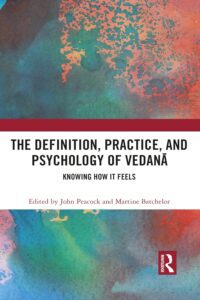 La définition, la pratique et la psychologie du Vedana : Savoir ce que l'on ressent
La définition, la pratique et la psychologie du Vedana : Savoir ce que l'on ressent
Ce livre examine l'importance du sujet de la 'tonalité du sentiment" (vedanā) tel qu'il apparaît dans les premiers textes et pratiques bouddhistes, ainsi que dans les interventions contemporaines, laïques et fondées sur la pleine conscience.
Ce volume vise à mettre en évidence la nature cruciale de la "tonalité du sentiment" ou du "goût de l'expérience" dans la détermination de la réactivité mentale, du comportement, du caractère et de l'éthique. Dans l'histoire du bouddhisme et dans sa réception dans le discours contemporain, vedanā a souvent été un sujet très négligé, l'accent étant mis sur d'autres aspects de la méditation, tels que le corps et l'esprit. Cependant, le "feeling tone" (vedanā) peut être considéré comme un point crucial dans la compréhension du processus cognitif, à la fois dans la pratique contemporaine de la pleine conscience et de la méditation dans les formes plus traditionnelles du bouddhisme. Le goût de l'expérience, affirme-t-on, vient comme agréable, désagréableet ni agréable ni désagréable - et ces "tons" ou "goûts" découlent inévitablement du fait que les humains sont des êtres sensoriels incarnés. Il est inévitable que l'expérience soit vécue de cette manière, mais ce qui s'ensuit peut être considéré comme de la réactivité ou de la réceptivité.
Cet ouvrage a été publié à l'origine sous la forme d'un numéro spécial de la revue Le bouddhisme contemporain.
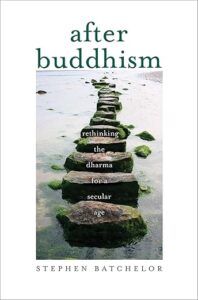 Après le bouddhisme : Repenser le dharma à l'ère de la laïcité
Après le bouddhisme : Repenser le dharma à l'ère de la laïcité
Quelque 25 siècles après le début de l'enseignement du Bouddha, son message continue d'inspirer les gens du monde entier, y compris ceux qui vivent dans des sociétés majoritairement laïques. Que signifie l'adaptation de pratiques religieuses à des contextes séculiers ? Stephen Batchelor, auteur et enseignant de renommée internationale, s'est engagé en faveur d'une version sécularisée des enseignements du Bouddha. Il estime que le temps est venu d'articuler une vision cohérente, éthique, contemplative et philosophique du bouddhisme pour notre époque.
Après le bouddhismeL'ouvrage, qui est l'aboutissement de quatre décennies d'études et de pratiques dans les traditions tibétaine, zen et theravada, est sa tentative de remettre les pendules à l'heure quant à l'identité du Bouddha et à ce qu'il essayait d'enseigner. En combinant des lectures critiques des premiers textes canoniques avec les récits de cinq membres du cercle intime du Bouddha, Batchelor dépeint le Bouddha comme un éthicien pragmatique plutôt que comme un métaphysicien dogmatique. Il envisage le bouddhisme comme une culture d'éveil en constante évolution, dont la survie perpétuelle est due à sa capacité à se réinventer et à interagir de manière créative avec chaque société qu'elle rencontre. Ce livre original et provocateur présente un nouveau cadre pour comprendre la remarquable diffusion du bouddhisme dans le monde globalisé d'aujourd'hui. Il nous rappelle également ce que la vision du Bouddha sur l'épanouissement humain avait de si surprenant.
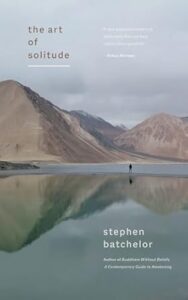 L'art de la solitude
L'art de la solitude
Lorsque Stephen Batchelor, écrivain bouddhiste de renommée mondiale, a eu 60 ans, il a pris un congé sabbatique de son enseignement et s'est tourné vers la solitude, une pratique qui fait partie intégrante des traditions méditatives qu'il a longtemps étudiées et enseignées. Son objectif était de s'aventurer plus profondément dans la solitude et d'en découvrir toute l'étendue et la profondeur.
Ce magnifique collage littéraire documente ses explorations aux multiples facettes. Passer du temps dans des endroits reculés, apprécier et faire de l'art, pratiquer la méditation et participer à des retraites, boire du peyotl et de l'ayahuasca, et s'entraîner à garder un esprit ouvert et interrogatif, tout cela a contribué à la capacité de Batchelor à être à la fois seul et à l'aise. À son récit personnel se mêlent des histoires inspirantes de praticiens dévoués à la solitude, du Bouddha à Montaigne, et de Vermeer à Agnes Martin.
Dans un monde hyperconnecté et en proie à l'isolement social, ce livre montre comment profiter de l'inéluctable solitude qui est au cœur de la vie humaine.
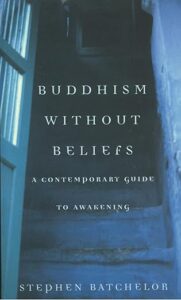 Le bouddhisme sans croyances
Le bouddhisme sans croyances
Avant d'être une religion, une culture ou même un système de méditation, qu'est-ce que le bouddhisme ? Sur Le bouddhisme sans croyances, Stephen Batchelor, célèbre enseignant, traducteur et ancien moine bouddhiste, nous ramène aux premières années qui ont suivi l'éveil du Bouddha pour révéler les idées fondamentales du bouddhisme, cachées sous des siècles d'histoire et d'interprétation.
En huit séances passionnantes d'introspection - comprenant de nombreux exercices et pratiques fascinants - nous apprenons à éveiller et à affiner nos sens, à introduire l'esprit essentiel de curiosité dans la pratique de la conscience, et à comprendre avec notre cœur et notre esprit les révélations étonnantes (et souvent mal comprises) du Bouddha sur la vacuité, la compassion et le soi. Avant de mourir, le Bouddha n'a pas désigné de successeur. Il a simplement fait remarquer que chacun d'entre nous devait être responsable de sa propre liberté.
Le bouddhisme sans croyances est une invitation à écouter ce que le Bouddha a enseigné - et à vous faire confiance sur votre propre chemin vers la libération.
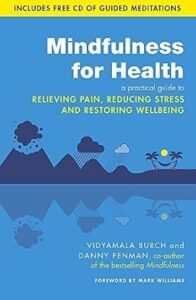 La pleine conscience pour la santé : Un guide pratique pour soulager la douleur, réduire le stress et retrouver le bien-être
La pleine conscience pour la santé : Un guide pratique pour soulager la douleur, réduire le stress et retrouver le bien-être
La douleur, la souffrance et le stress peuvent être intolérables, mais il n'est pas nécessaire qu'il en soit ainsi. La pleine conscience au service de la santé révèle un ensemble de pratiques simples que vous pouvez intégrer dans votre vie quotidienne pour soulager la douleur chronique, la souffrance et le stress. Des essais cliniques montrent que la méditation de pleine conscience est au moins aussi efficace que les analgésiques les plus couramment prescrits et peut être plus puissante que la morphine. La pleine conscience peut également réduire de manière significative l'anxiété, la dépression, l'irritabilité, l'épuisement et l'insomnie qui peuvent découler de la douleur et de la maladie chroniques.
La pleine conscience au service de la santé est basé sur un programme de méditation unique développé par Vidyamala Burch pour l'aider à faire face à la douleur sévère d'une blessure à la colonne vertébrale. Le centre Breathworks fondé par Vidyamala - et ses affiliés dans le monde entier - ont aidé des milliers de personnes à faire face à la douleur, à la maladie et au stress. Le professeur Mark Williams de l'université d'Oxford, Jon Kabat Zinn et le professeur Lance McCraken du King's College de Londres ont fait l'éloge de cette approche novatrice. Le programme de huit semaines au cœur de ce livre ne prend que 10 à 20 minutes par jour. Vous serez surpris par la rapidité avec laquelle vos souffrances disparaîtront, laissant place à un amour profond de la vie. Ce titre comprend huit méditations guidées qui apparaissent tout au long de l'audio et qui sont rassemblées à la fin.
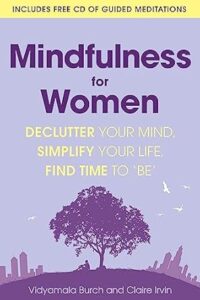 La pleine conscience pour les femmes : Désencombrez votre esprit, simplifiez votre vie, trouvez le temps d'"être".
La pleine conscience pour les femmes : Désencombrez votre esprit, simplifiez votre vie, trouvez le temps d'"être".
Peu importe qui nous sommes ou à quel stade de la vie nous nous trouvons, nous aspirons tous à des choses similaires : être heureux, en contact avec les autres, en contact avec un sentiment de calme et de paix, vital, vivant et joyeux. Et nous aspirons à pouvoir surmonter les périodes difficiles qui nous frappent tous de temps à autre avec un certain degré de grâce et de dignité.
La bonne nouvelle, c'est que nous pouvons satisfaire ces désirs à tout moment et en tout lieu. Il suffit d'un instant, d'un souffle. Nous pouvons apprendre à être à l'aise avec notre corps, à connaître et à comprendre notre esprit et à aimer notre cœur. Ce n'est ni difficile, ni long, ni fastidieux.
Ce faisant, vous vous sentirez plus heureux dans votre peau, moins stressé, plus confiant, plus capable et plus à l'aise avec vous-même et avec la vie. C'est ce que La pleine conscience pour les femmes est un guide pratique pour se retrouver dans chaque moment présent. Il s'agit d'un guide pratique pour rentrer chez soi à chaque instant présent. Pour trouver la corniche derrière la cascade.
Se reposer dans les profondeurs de l'océan plutôt que d'être ballotté par les vagues de surface. La pleine conscience est un puissant antidote contre l'anxiété, le stress, la dépression, l'épuisement et l'irritabilité. Elle conduit à un plus grand sentiment de satisfaction et peut également réduire les schémas comportementaux addictifs et autodestructeurs.
Ce livre audio vous permettra d'en expérimenter les avantages par vous-même. Il n'est pas conçu comme un long cours, mais est basé sur des solutions. Il est rapide - il est prouvé qu'un peu de pleine conscience suffit pour faire un bon bout de chemin. Il est également personnalisé : vous pouvez le lire d'un bout à l'autre, ou simplement le parcourir, en fonction de ce sur quoi vous souhaitez vous concentrer.
Vous pouvez écouter la piste de méditation qui vous convient à tout moment et vous pouvez enchaîner les pistes si vous souhaitez méditer plus longtemps. Il est conçu pour s'adapter à votre vie et à vos priorités d'aujourd'hui et de demain.
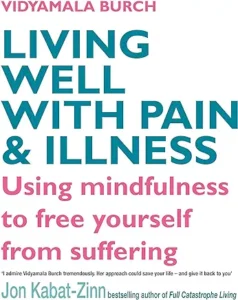 Bien vivre avec la douleur et la maladie : Utiliser la pleine conscience pour se libérer de la souffrance
Bien vivre avec la douleur et la maladie : Utiliser la pleine conscience pour se libérer de la souffrance
Vidyamala Burch souffre de douleurs chroniques depuis plus de 30 ans en raison d'une faiblesse congénitale, d'un accident de voiture et d'une opération chirurgicale infructueuse. Elle se déplace aujourd'hui en fauteuil roulant. Dans ce nouveau livre positif et rassurant, elle explique que c'est notre résistance à la douleur qui la rend si pénible et misérable. Nous ne voulons pas que cela nous arrive et nous aimerions ne pas en souffrir.
LIVING WELL WITH PAIN AND ILLNESS est un guide pratique pour vivre avec et gérer la douleur chronique grâce au principe de la pleine conscience. En développant une conscience calme de votre corps et de votre douleur, vous pouvez apprendre à vous débarrasser de la frustration et de la souffrance que vous associez à la douleur, et la douleur diminuera.Vidyamala Burch utilise des techniques de respiration faciles à suivre et de puissantes méditations de pleine conscience qui vous enseignent comment vivre dans le moment présent. LIVING WELL WITH PAIN AND ILLNESS comprend des illustrations utiles, offre des moyens efficaces de gérer la douleur chronique et constitue une lecture indispensable pour toutes les personnes souffrant de douleurs.
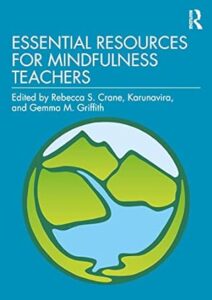 Ressources essentielles pour les enseignants de la pleine conscience offre au lecteur une mine de connaissances sur les aspects explicites et implicites de l'enseignement basé sur la pleine conscience.
Ressources essentielles pour les enseignants de la pleine conscience offre au lecteur une mine de connaissances sur les aspects explicites et implicites de l'enseignement basé sur la pleine conscience.
Le livre se concentre sur la manière de développer l'art d'enseigner des cours basés sur la pleine conscience et est divisé en trois parties. La première partie aborde les éléments explicites des cours basés sur la pleine conscience, tels que la manière de proposer des pratiques de méditation et de recherche. La deuxième partie étudie les qualités implicites, subtiles mais puissantes, nécessaires à l'enseignant pour transmettre l'essence de la pleine conscience. La troisième partie est une série de chapitres sur les fondements, les considérations et les théories entourant l'enseignement des cours basés sur la pleine conscience, et comprend un nouveau cadre pour la pratique réflexive - le Mindfulness-Based Interventions : Teaching and Learning Companion (TLC).
Ce livre est un compagnon essentiel pour les enseignants en formation et les enseignants confirmés basés sur la pleine conscience, et c'est une ressource à laquelle vous reviendrez encore et encore.
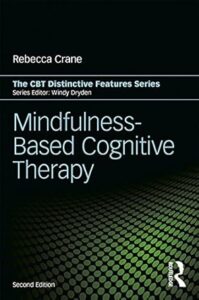 Cette nouvelle édition de La thérapie cognitive basée sur la pleine conscience : Caractéristiques distinctives (MBCT) offre une vue d'ensemble concise et directe de la MBCT, entièrement mise à jour pour inclure les développements récents. Le processus de formation qui sous-tend la MBCT est basé sur la pratique de la méditation de pleine conscience et invite à une nouvelle orientation vers l'expérience interne telle qu'elle se présente - une orientation caractérisée par l'acceptation et la compassion. L'approche soutient la reconnaissance du fait que même si les difficultés font intrinsèquement partie de la vie, il est possible de travailler avec elles d'une manière nouvelle.
Cette nouvelle édition de La thérapie cognitive basée sur la pleine conscience : Caractéristiques distinctives (MBCT) offre une vue d'ensemble concise et directe de la MBCT, entièrement mise à jour pour inclure les développements récents. Le processus de formation qui sous-tend la MBCT est basé sur la pratique de la méditation de pleine conscience et invite à une nouvelle orientation vers l'expérience interne telle qu'elle se présente - une orientation caractérisée par l'acceptation et la compassion. L'approche soutient la reconnaissance du fait que même si les difficultés font intrinsèquement partie de la vie, il est possible de travailler avec elles d'une manière nouvelle.
Le livre fournit une base pour comprendre les principales caractéristiques théoriques et pratiques de la MBCT et conserve le format accessible et facile à utiliser qui a rendu la première édition si populaire, avec 30 éléments distinctifs qui caractérisent l'approche. La thérapie cognitive basée sur la pleine conscience : Caractéristiques distinctives sera une lecture essentielle pour les professionnels et les stagiaires dans ce domaine. Il s'agit d'une lecture attrayante tant pour les praticiens expérimentés que pour les nouveaux venus intéressés par la TCPC.
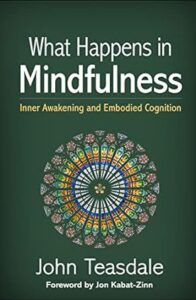 Ce qui se passe dans la pleine conscience : L'éveil intérieur et la cognition incarnée
Ce qui se passe dans la pleine conscience : L'éveil intérieur et la cognition incarnée
Bien connu pour avoir appliqué la pleine conscience au traitement de la dépression, le chercheur pionnier John Teasdale explore aujourd'hui les changements plus larges que les gens peuvent ressentir grâce aux pratiques contemplatives. Que se passe-t-il dans notre esprit lorsque nous sommes en pleine conscience ? Que signifie parler de la pleine conscience comme d'une manière d'être ? D'un point de vue scientifique, comment les éléments fondamentaux des traditions contemplatives produisent-ils leurs effets bénéfiques ? Teasdale décrit deux types de connaissance que les êtres humains ont développés - conceptuelle et holistique-intuitive - et montre comment la pleine conscience peut atteindre un équilibre plus sain entre les deux. Il décrit magistralement les mécanismes par lesquels ce changement de conscience peut non seulement réduire la souffrance émotionnelle, mais aussi conduire à une joie et une compassion accrues, ainsi qu'à un sentiment de soi transformé.
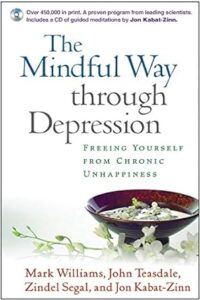 La voie de la pleine conscience à travers la dépression : Se libérer du malheur chronique
La voie de la pleine conscience à travers la dépression : Se libérer du malheur chronique
Si vous avez déjà lutté contre la dépression ou si vous connaissez quelqu'un qui l'a fait, prenez courage : La pratique de la pleine conscience est un moyen simple et puissant de rompre naturellement le cycle d'auto-entretien de la dépression. Avec la La voie de la pleine conscience pour surmonter la dépressionQuatre éminents chercheurs présentent des leçons éclairantes tirées des traditions méditatives orientales et de la thérapie cognitive sur la façon de triompher de cette maladie - et, plus important encore, sur la façon de l'empêcher de frapper à nouveau. Rejoignez ces experts exceptionnellement qualifiés pour découvrir le pouvoir de la thérapie cognitive basée sur la pleine conscience.
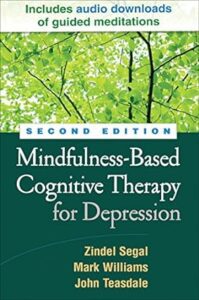 Thérapie cognitive basée sur la pleine conscience pour la dépression, deuxième édition : Une nouvelle approche pour prévenir les rechutes
Thérapie cognitive basée sur la pleine conscience pour la dépression, deuxième édition : Une nouvelle approche pour prévenir les rechutes
Cet ouvrage acclamé, aujourd'hui dans une nouvelle édition, a initié des dizaines de milliers de cliniciens à la thérapie cognitive basée sur la pleine conscience (MBCT) pour la dépression, un programme de 8 semaines dont l'efficacité a été prouvée. Étape par étape, les auteurs expliquent le "pourquoi" et le "comment" des pratiques de pleine conscience et des interventions cognitives dont il a été démontré qu'elles favorisent la guérison de la dépression et préviennent les rechutes. Les cliniciens sont également guidés pour pratiquer eux-mêmes la pleine conscience, une condition préalable essentielle pour enseigner aux autres. Quarante-cinq documents reproductibles sont inclus. Les acheteurs ont accès à un site Web d'accompagnement comprenant des enregistrements audio téléchargeables des pratiques guidées de pleine conscience (méditations et mouvements de pleine conscience), ainsi que tous les documents reproductibles, prêts à être téléchargés et imprimés dans un format pratique de 8 1/2″ x 11″. Un site web séparé à l'usage des clients présente uniquement les enregistrements audio.
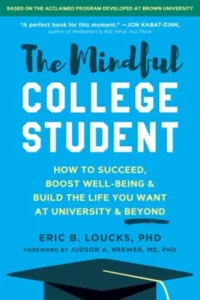 Le cadeau idéal pour l'étudiant qui se prépare à entrer à l'université ! Basé sur le populaire programme Mindfulness-Based College (MBC) de l'Université de Brown, ce livre offre des compétences puissantes pour améliorer la réussite scolaire et renforcer la santé mentale, physique, spirituelle et émotionnelle, aujourd'hui et pour toute la vie. L'université est une période de transition. C'est le moment d'apprendre et de se préparer à faire son chemin dans le monde. Mais si vous êtes comme beaucoup d'adolescents et de jeunes adultes, l'idée de quitter la maison et de vous retrouver seul dans un nouvel endroit peut être intimidante, voire accablante. C'est pourquoi vous avez besoin d'une base solide pour vous aider à gérer le stress, à rester concentré et à maintenir des habitudes saines - pour le corps, l'esprit et l'âme. Fondé sur la pleine conscience, The Mindful College Student vous aidera à cultiver les compétences cognitives et émotionnelles dont vous avez besoin pour accroître votre bien-être et atteindre vos aspirations les plus élevées. Vous apprendrez également des stratégies d'adaptation positives pour gérer le stress, la tristesse et l'anxiété, y compris l'alimentation, la forme physique et les habitudes de sommeil. Plus important encore, vous découvrirez trois compétences fondamentales d'autorégulation qui vous aideront à vous diriger vers la vie que vous souhaitez : la conscience de soi, le contrôle de l'attention et la régulation des émotions. Préparez-vous à affronter le monde avec ce guide amusant et instructif, rempli de tout ce dont vous avez besoin pour faire face à tous les défis de la vie universitaire et au-delà !
Le cadeau idéal pour l'étudiant qui se prépare à entrer à l'université ! Basé sur le populaire programme Mindfulness-Based College (MBC) de l'Université de Brown, ce livre offre des compétences puissantes pour améliorer la réussite scolaire et renforcer la santé mentale, physique, spirituelle et émotionnelle, aujourd'hui et pour toute la vie. L'université est une période de transition. C'est le moment d'apprendre et de se préparer à faire son chemin dans le monde. Mais si vous êtes comme beaucoup d'adolescents et de jeunes adultes, l'idée de quitter la maison et de vous retrouver seul dans un nouvel endroit peut être intimidante, voire accablante. C'est pourquoi vous avez besoin d'une base solide pour vous aider à gérer le stress, à rester concentré et à maintenir des habitudes saines - pour le corps, l'esprit et l'âme. Fondé sur la pleine conscience, The Mindful College Student vous aidera à cultiver les compétences cognitives et émotionnelles dont vous avez besoin pour accroître votre bien-être et atteindre vos aspirations les plus élevées. Vous apprendrez également des stratégies d'adaptation positives pour gérer le stress, la tristesse et l'anxiété, y compris l'alimentation, la forme physique et les habitudes de sommeil. Plus important encore, vous découvrirez trois compétences fondamentales d'autorégulation qui vous aideront à vous diriger vers la vie que vous souhaitez : la conscience de soi, le contrôle de l'attention et la régulation des émotions. Préparez-vous à affronter le monde avec ce guide amusant et instructif, rempli de tout ce dont vous avez besoin pour faire face à tous les défis de la vie universitaire et au-delà !
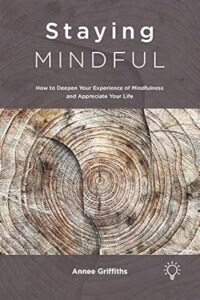 Rester en pleine conscience : comment approfondir votre expérience de la pleine conscience et apprécier votre vie
Rester en pleine conscience : comment approfondir votre expérience de la pleine conscience et apprécier votre vie
Il est difficile de maintenir une pratique de la méditation de pleine conscience. Nombreux sont ceux qui suivent un cours d'introduction à la pleine conscience de huit semaines avec les meilleures intentions du monde, mais qui laissent rapidement retomber les choses lorsque des pressions concurrentes prennent le dessus et que le temps de s'arrêter et de réfléchir se tarit. S'attaquer à ce problème, Rester attentif rafraîchit et approfondit les connaissances acquises dans les cours d'introduction habituels et fournit une multitude de conseils pour encourager et inspirer une pratique continue.
Basé sur un cours de six semaines développé et dirigé depuis de nombreuses années par l'auteur, Rester attentif est le guide idéal pour toute personne souhaitant développer ses compétences en matière de pleine conscience. Il présente de nouveaux sujets tels que le travail sur la difficulté et la gratitude, ainsi que des pratiques de pleine conscience plus avancées (telles que la gestion de l'anxiété). Le livre dans son ensemble peut être utilisé comme un cours d'auto-apprentissage, en parcourant les chapitres et les pratiques de manière séquentielle, ou comme une ressource prête à l'emploi dans laquelle on peut puiser en cas de besoin.
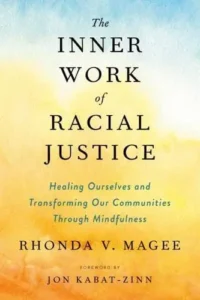 "Il éclaire le cœur même de la justice sociale et la façon dont elle peut être abordée et nourrie par des pratiques de pleine conscience au sein de la communauté et par le discernement et les nouveaux degrés de liberté que ces pratiques entraînent. Extrait de l'avant-propos de Jon Kabat-Zinn
"Il éclaire le cœur même de la justice sociale et la façon dont elle peut être abordée et nourrie par des pratiques de pleine conscience au sein de la communauté et par le discernement et les nouveaux degrés de liberté que ces pratiques entraînent. Extrait de l'avant-propos de Jon Kabat-Zinn
Dans une société où les préjugés inconscients, les microagressions, le racisme institutionnalisé et les injustices systémiques sont si profondément ancrés, la guérison est un processus continu. Lorsque le conflit et la division sont des réalités quotidiennes, notre instinct nous pousse à resserrer les rangs, à trouver la sécurité de ceux qui nous ressemblent et à blâmer les autres. Ce livre montre profondément que pour avoir les conversations difficiles nécessaires à la justice raciale, un travail intérieur est essentiel. Grâce à la pratique de la pleine conscience incarnée, qui consiste à prêter attention à nos pensées, à nos sentiments et à nos sensations physiques de manière ouverte et sans jugement, nous augmentons notre résilience émotionnelle, nous reconnaissons nos propres préjugés et nous devenons moins réactifs en cas de déclenchement.
Comme Sharon Salzberg, New York TimesAuteur du best-seller Le vrai bonheur écrit : "Rhonda Magee est une nouvelle voix importante que j'avais envie d'entendre depuis longtemps - une voix à la fois puissante et profondément aimante qui aborde la question de la race et du racisme". Magee montre que la pleine conscience incarnée calme nos peurs et nous aide à faire preuve d'autocompassion. Ces pratiques nous aident à ralentir et à réfléchir aux microagressions, à les considérer avec une certaine objectivité et une certaine distance, plutôt que d'enfouir les expériences désagréables pour qu'elles aient un effet cumulatif au fil du temps. Magee nous aide à développer la capacité d'aborder les peurs et les angoisses qui, autrement, nous conduiraient à recréer des schémas de séparation et de division.
Ce n'est qu'en guérissant des injustices et en dissolvant nos barrières personnelles à la connexion que nous développons la capacité de voir les autres avec compassion et de vivre en communauté avec des personnes d'origines et de points de vue très différents. L'ouvrage intègre des exercices de pleine conscience, des recherches et les idées durement acquises de Magee, Le travail intérieur de la justice raciale offre une feuille de route pour un monde plus pacifique.
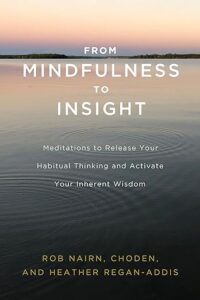 De la pleine conscience à la perspicacité : Méditations pour libérer vos pensées habituelles et activer votre sagesse inhérente
De la pleine conscience à la perspicacité : Méditations pour libérer vos pensées habituelles et activer votre sagesse inhérente
Ce livre montre comment aller au-delà des techniques séculaires de pleine conscience et de compassion pour cultiver la perspicacité - voir et ainsi se libérer des pensées répétitives qui nous enferment dans des cycles de souffrance.
La plupart des ouvrages s'inscrivant dans la tradition séculaire de la pleine conscience s'arrêtent à la pleine conscience et à l'auto-compassion, mais ne font pas grand-chose pour découvrir les causes profondes de notre souffrance. S'appuyant à la fois sur les analyses bouddhistes de l'esprit et sur les découvertes actuelles en psychologie et en neurosciences, ce livre explique comment nos pensées se figent et se routinisent en s'engageant dans des préférences et des réactions inconscientes.
En cultivant la perspicacité, nous pouvons nous libérer de ces schémas, ce qui conduit à une plus grande équanimité, à la liberté et à la compassion.
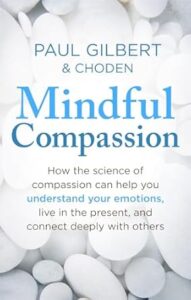 Compassion consciente
Compassion consciente
Basé sur les derniers travaux du professeur Paul Gilbert OBE, auteur à succès de L'esprit de compassionet l'expert bouddhiste Choden.
Le professeur Gilbert a passé les vingt dernières années à développer une nouvelle thérapie appelée Compassion-Focused Therapy (CFT) qui a acquis une renommée internationale. Ces dernières années, la pleine conscience est de plus en plus utilisée pour traiter des problèmes de santé mentale courants tels que la dépression, le stress et l'insomnie liée au stress.
Dans ce nouveau livre révolutionnaire, le professeur Gilbert et son coauteur Choden combinent le meilleur de la thérapie centrée sur la compassion avec les techniques de pleine conscience les plus efficaces. Il en résulte une approche extrêmement efficace pour surmonter les problèmes émotionnels et psychologiques quotidiens et améliorer le sentiment de bien-être.
 Cours sur la vie basée sur la pleine conscience : Une version d'auto-assistance du cours populaire Mindfulness de huit semaines, mettant l'accent sur la gentillesse et l'autocompassion, et comprenant des méditations guidées.
Cours sur la vie basée sur la pleine conscience : Une version d'auto-assistance du cours populaire Mindfulness de huit semaines, mettant l'accent sur la gentillesse et l'autocompassion, et comprenant des méditations guidées.
Une version d'auto-assistance du cours populaire Mindfulness de huit semaines, qui met l'accent sur la gentillesse et l'autocompassion. La pleine conscience est une capacité innée de l'esprit qui peut être entraînée pour atténuer le stress et la mauvaise humeur, pour réduire le pouvoir de la rumination et de l'autocritique, et pour évoquer le bien-être émotionnel et la proactivité. Le cours sur la vie basée sur la pleine conscience est un guide pratique pour le développement d'une approche de la vie basée sur la pleine conscience dans le monde moderne. Il se distingue par une approche compatissante de la pleine conscience, fondée sur de nombreuses années d'expérience dans la pratique et l'enseignement de la pleine conscience par deux de ses principaux représentants - l'ancien moine bouddhiste Choden et Heather Regan-Addis, tous deux directeurs de l'Association pour la pleine conscience (Mindfulness Association).
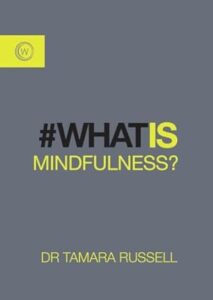 Qu'est-ce que la pleine conscience ?
Qu'est-ce que la pleine conscience ?
La pleine conscience est enfin dans l'œil de la tempête publique, mais cette tempête s'accompagne d'idées fausses. Neuroscientifique, psychologue clinicien et enseignant de la pleine conscience Dr. Tamara Russell vous guidera et démystifiera la nature réelle et poignante de la pleine conscience ainsi que ses bienfaits pour la santé, vous permettant de comprendre comment une seule chose a aidé tant de personnes à dompter leur mental en ébullition et à vivre en pleine conscience, y compris.. :
#Que signifie réellement la pleine conscience et quels en sont les avantages ?
1TP5Comment cela fonctionne-t-il réellement ?
#D'où vient-il ?
1TP5Comment en tirer le meilleur parti ?
#Quelles sont les possibilités futures ?
Le tout sous forme de questions-réponses décisives, couplées à des exercices pratiques qui vous permettront d'explorer l'art de la pleine conscience, Qu'est-ce que la pleine conscience ? vous emmènera dans les coulisses de cette pratique qui change la vie.
-
Retraites dans l'obscurité : Privation sensorielle et pratique de la pleine conscience Marcin Czub
-
Créer le bien-être : L'introduction de programmes de pleine conscience au sein de l'école d'art de Glasgow Marjory Bond
-
Trois histoires de combinaison de poésie et de pleine conscience pour créer de nouveaux espaces d'apprentissage inclusifs dans l'enseignement supérieur Terry Barrett
-
Effets d'une brève pratique de la pleine conscience sur les résultats en matière de santé psychologique : La fréquence des pratiques est-elle importante ? Paveen Phon Amnuaisuk
-
L'effet d'un programme adapté de réduction du stress basé sur la pleine conscience sur la santé mentale, l'attachement prénatal et les résultats à la naissance chez les femmes enceintes ayant des antécédents de troubles mentaux avant la conception : un protocole d'étude pour un essai contrôlé randomisé dans un cadre ambulatoire danois en milieu hospitalier. Sine Skovbjerg
-
Améliorer l'enseignement et la recherche sur la pleine conscience avec l'application Mindful Brian : Une approche locale Stephan Schoenig
-
Explorer l'impact de la pleine conscience sur les expériences en classe, les relations entre enseignants et élèves et la pleine conscience des élèves : Auto-étude d'un formateur d'enseignants Yeh Chen Kuo
-
La pleine conscience en tant qu'intervention pour l'autorégulation et la réintégration scolaire dans une école primaire traumatisée après le lockdown du Covid -19 Katrina Diamond
-
L'impact de la pratique de la pleine conscience à court terme sur la mémoire prospective et la mémoire de travail Yuan Huei Lin
-
Enseignement en ligne de programmes basés sur la pleine conscience : Données démographiques des enseignants, coûts perçus et avantages. Alison Burton
-
Formation clinique et supervision : Une approche en pleine conscience Jamie E. Banker
-
La pleine conscience comme fondement éthique de la profession d'enseignant : Exploration des points de vue des enseignants en formation initiale et en cours d'emploi à Hong Kong Ngarsze Lau
-
Mindfulness Projet de livre électronique sur l'anglais langue seconde pour adultes et la littératie en matière de santé Shelita Birchett Benash
-
Réduire l'anxiété liée aux langues étrangères dans une classe d'anglais universitaire intégrée à la pleine conscience : Une observation ethnographique Hazel Yang Hui
-
Étude de la relation entre la pleine conscience et l'altruisme chez les adolescents. Nina Zammit
-
Pour qui une brève induction à la pleine conscience est-elle efficace ? Une exploration du rôle modérateur des différences individuelles dans l'effet de l'induction de la pleine conscience sur les fonctions exécutives et le vagabondage de l'esprit Ke Shi
-
Au-delà du soutien monolithique : Interpersonal Style Mediates the Link Between Mindfulness and Support Behavior (Le style interpersonnel est un médiateur du lien entre la pleine conscience et le comportement de soutien). Wei-Fang Lin
-
Expériences des survivants d'AVC en matière d'interventions basées sur la pleine conscience et le yoga : une revue systématique qualitative et une méta-agrégation Naomi Clark
-
Expériences des participants à la suite d'une intervention basée sur la pleine conscience pour les étudiants universitaires ; une étude qualitative Catherine Doody
-
Effets de la thérapie cognitive basée sur la pleine conscience sur le rétablissement personnel dans le cadre d'un traitement psychiatrique de jour avec retour au travail au Japon : un essai contrôlé non randomisé avec un groupe de contrôle. Aya Midorikawa
